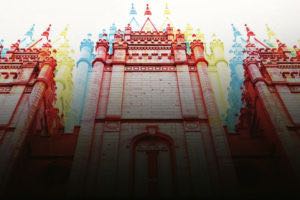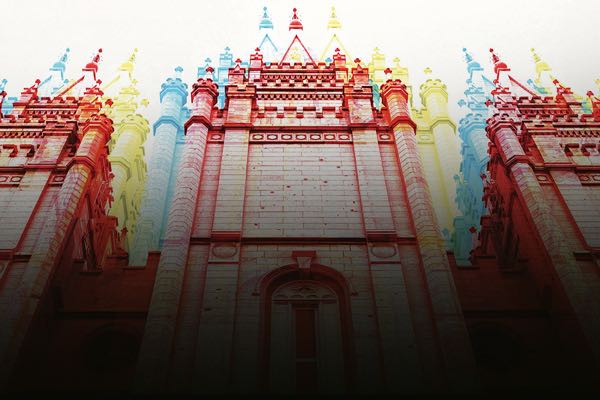
J. Warner:
Corey, I know your work quite well, but there may be some in my audience who aren’t as familiar with you. Tell us about your current position with Ratio Christi and a bit about your ministry journey.
Corey:
I’m the President/CEO of Ratio Christi, which is a campus apologetics evangelism ministry. We desire to see lives transformed by thoughtful Christianity from campus to culture. I served on staff for several years at various churches, but have always had a passion for evangelism and a strategy to reclaim the voice of Christ in the university. I suppose you could say that this passion developed shortly after I left Mormonism and became a Christian. I was challenged in my newfound biblical faith and I encountered a short stint of skepticism. This led me into a trajectory to study philosophy and comparative religions and make an impact on the most influential institution of western civilization, The University.
J. Warner:
You’ve contributed to an interesting new book about your experience with Mormonism. Why did you want to be a part of this book, and how is this book different from other books about Mormonism?
Corey:
The book was an idea that captured me about a decade ago. But given some hostility that I faced in obtaining my PhD there was some delay. I noticed that there was a missing piece in the conversation between Evangelical and Mormons, namely, those who satisfied the criteria of being Christian scholars who once were Mormon insiders. There were but six I was aware of and four who decided to join the project. Speaking “Mormonese,” we use the language of experience and bear our testimonies in the book by sharing our stories. But we also have sections where we each give reasons relative to our disciplines and personal convictions as to why we reject Mormonism and pursue Jesus instead. Further, we offer a concluding chapter aimed at those in the Mormon exodus heading for neo-atheism. We want them to consider the proper detour, biblical Christianity.
J. Warner:
Is there something about your life as an academic that was an important ingredient in your journey away from Mormonism?
Corey:
Yes, prior to coming to Christ I had no academic bone in my body. Becoming a biblical Christian and being challenged by my Mormon friends and family to reconsider my apostasy from Mormonism and conversion to historic Christianity forced me into an insatiable quest for truth. Knowledge took on new meaning and interest for me. This is as it should be given that the ultimate end of life is the knowledge of God. I acquired three masters degrees and a PhD and now teach philosophy and comparative religions at Indiana University-Kokomo part-time while being the President of Ratio Christi full-time.
J. Warner:
Can you tell us what first caused you to doubt Mormonism and a little bit about your unique journey away from Mormonism?
Corey:
My Mormon heritage extends back to my ancestor being a body guard of Joseph Smith. I first began to doubt the Mormon community, not its theology. I wasn’t baptized at the standard age of eight because I was serious about eternity. Even at eight, I was aware of the internal contradiction between the philosophy I’d learned, “try, try your best and God will make up the rest,” and the real requirements of entering heaven. I wanted to spend eternity with Heavenly Father. Thus, desiring to be with him and knowing the goal was perfection, I figured I’d beat the system and wait until I was 88. Struggling for a year, knowing I needed to be baptized by proper priestly authority as a necessity, I capitulated at age nine and was baptized. My decision was well thought through and one of conviction, not tradition. But the tension was real. The hypocrisy I encountered in the community was real. So real that it drove me away, not from believing in Mormonism–but from church attendance to a lifestyle I’m not proud of where I found “acceptance.” Then, while not looking for another religion (even though I struggled with the religious community), Jesus revealed himself to me at a Christian camp and my life was forever changed! I moved to CA for my junior year of high school where I was discipled and came back to Utah my senior year to graduate. That is when the pressure was on and I had to consider whether I had made the best decision. I engaged in philosophy, science, and the study of comparative religions. I was also introduced to Christian apologetics and the rest is history.
J. Warner:
What advice would you give to people who still have family or friends in Mormonism to help them communicate the truth to the people they love?
Corey:
First, genuinely love Mormons. They are not the enemy, but are instead people for whom Christ died. If they are to convert, they need to see an alternative community for which they can belong. Second, be perceived by them as a truth seeker. That should be easy if you really are a truth seeker, but it is important to be perceived that way in the dialogue. Third, engage via Socratic dialogue. Like no one else, Mormons are accustomed to being in the role of teacher because most beyond high school have served two-year missions. Questions show personal interest and create an environment of reflective bridge building rather than deflective walls. Fourth, focus on the essentials of God and salvation. Fifth, last but not least, pray. Far too often we fail to realize the spiritual battle.
If you know someone who is still a member of the Church of Latter Day Saints, Corey’s new book might help you better understand the teaching and claims of Mormonism, as seen through the eyes of scholars who eventually became Christians. Leaving Mormonism: Why Four Scholars Changed Their Minds is yet another valuable resource to help you dialogue with Mormon believers.

J. Warner Wallace is a Dateline featured Cold-Case Detective, Senior Fellow at the Colson Center for Christian Worldview, Adj. Professor of Christian Apologetics at Talbot School of Theology, Biola University, author of Cold-Case Christianity, God’s Crime Scene, and Forensic Faith, and creator of the Case Makers Academy for kids.
Subscribe to J. Warner’s Daily Email
J. Warner Wallace is a Dateline featured cold-case homicide detective, popular national speaker and best-selling author. He continues to consult on cold-case investigations while serving as a Senior Fellow at the Colson Center for Christian Worldview. He is also an Adj. Professor of Christian Apologetics at Talbot School of Theology, Biola University, and a faculty member at Summit Ministries. He holds a BA in Design (from CSULB), an MA in Architecture (from UCLA), and an MA in Theological Studies (from Gateway Seminary).
































